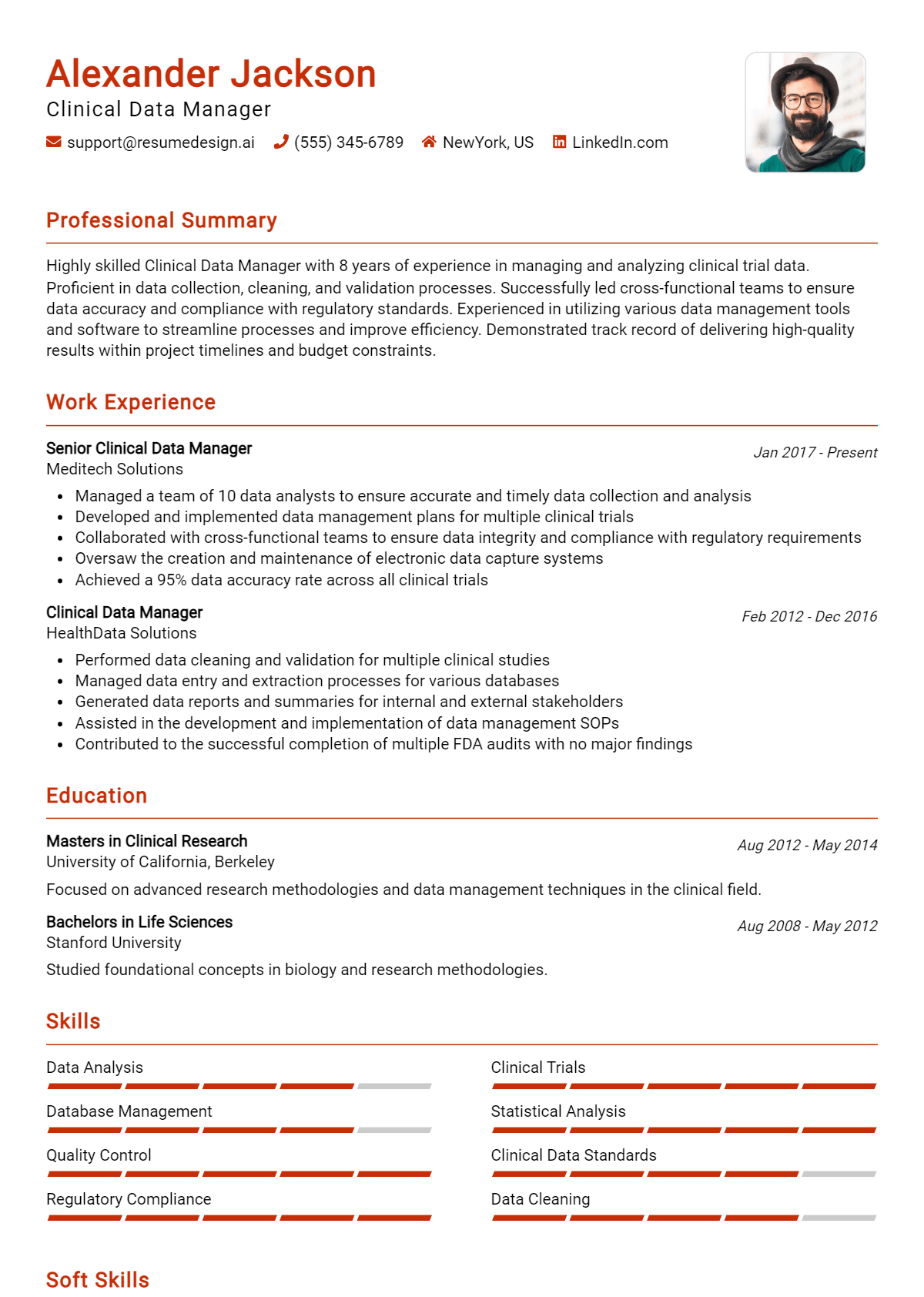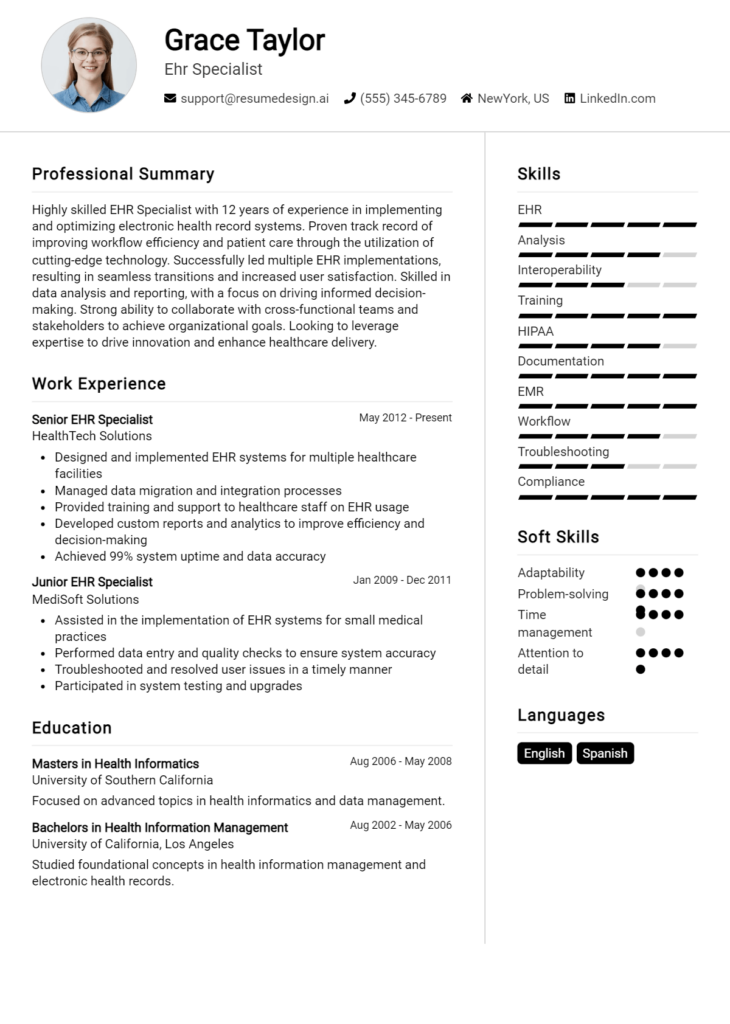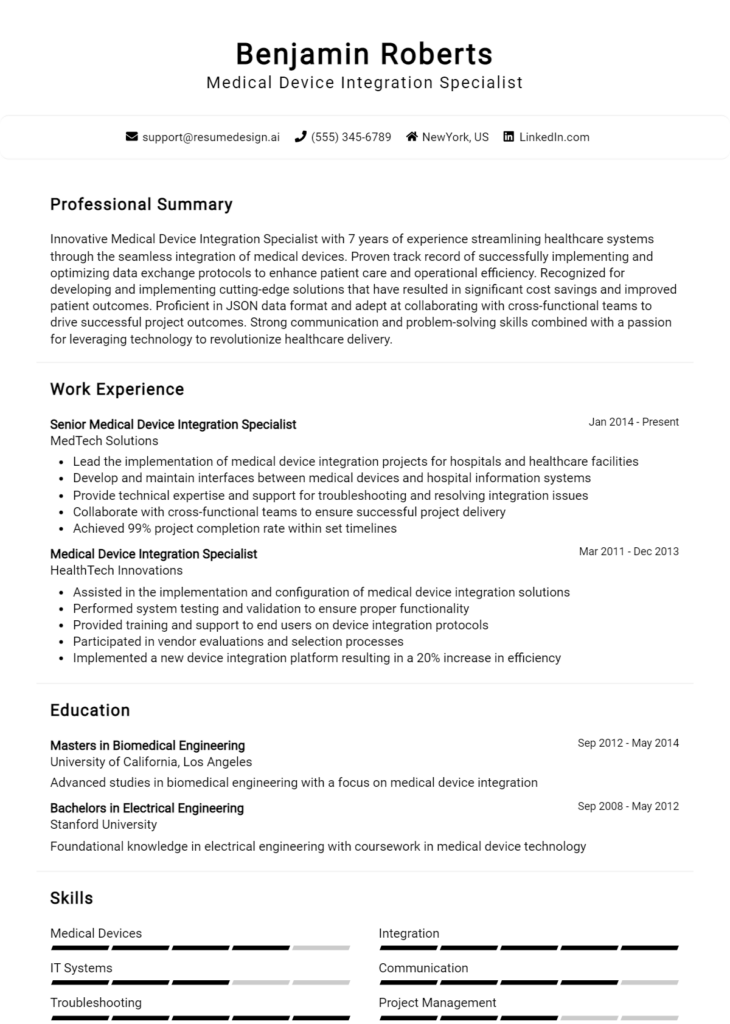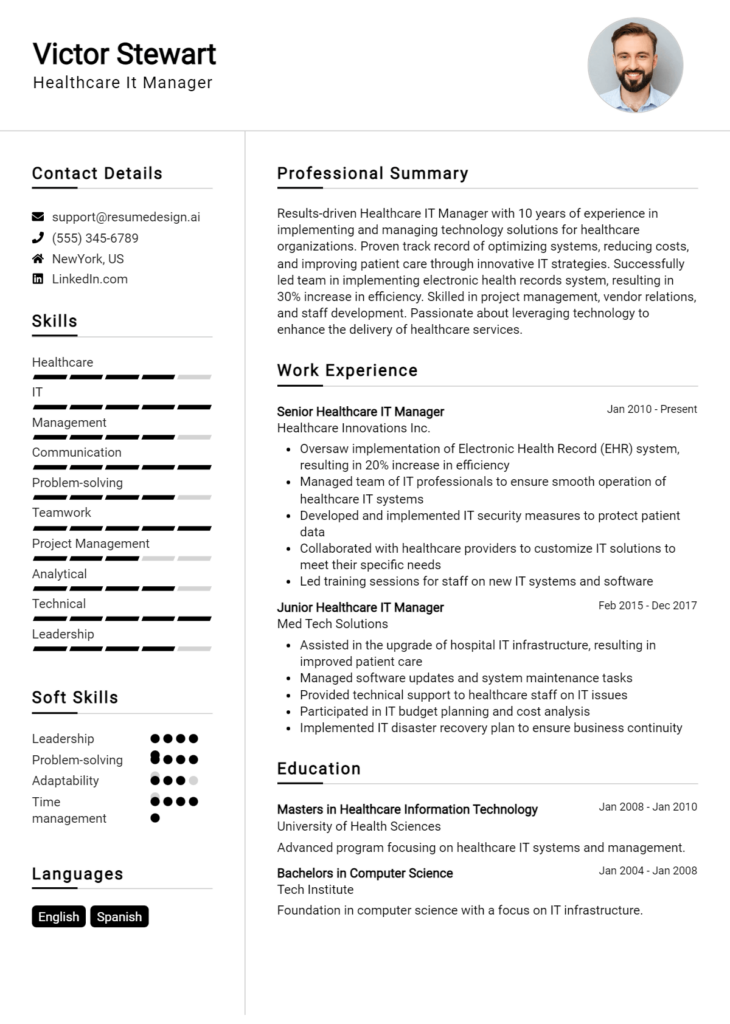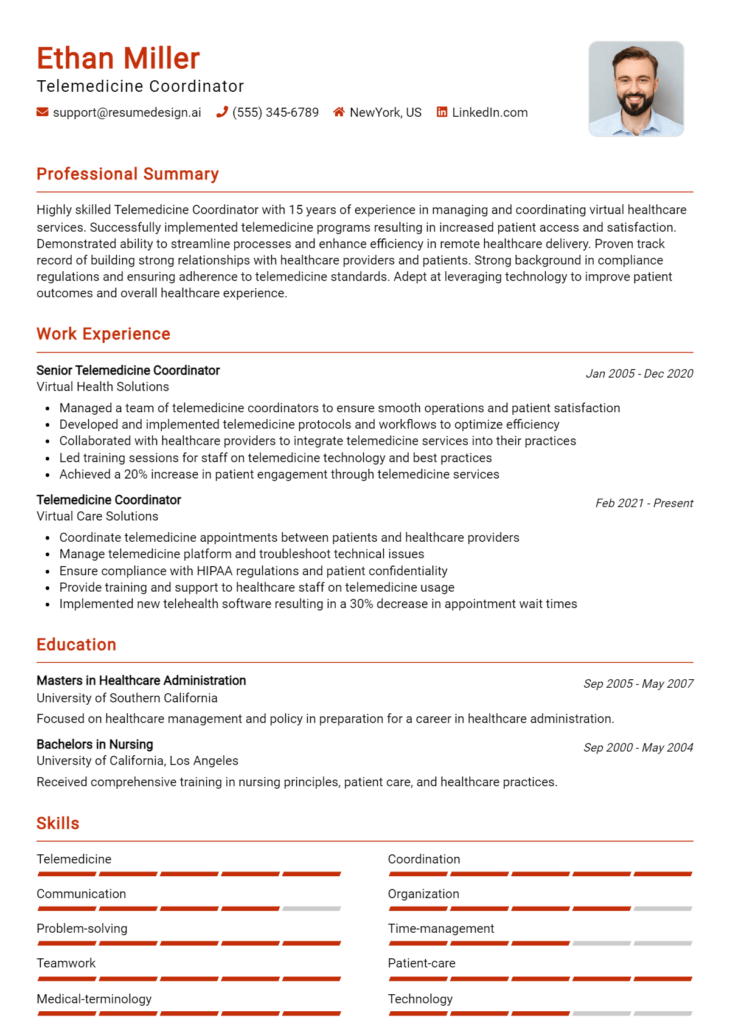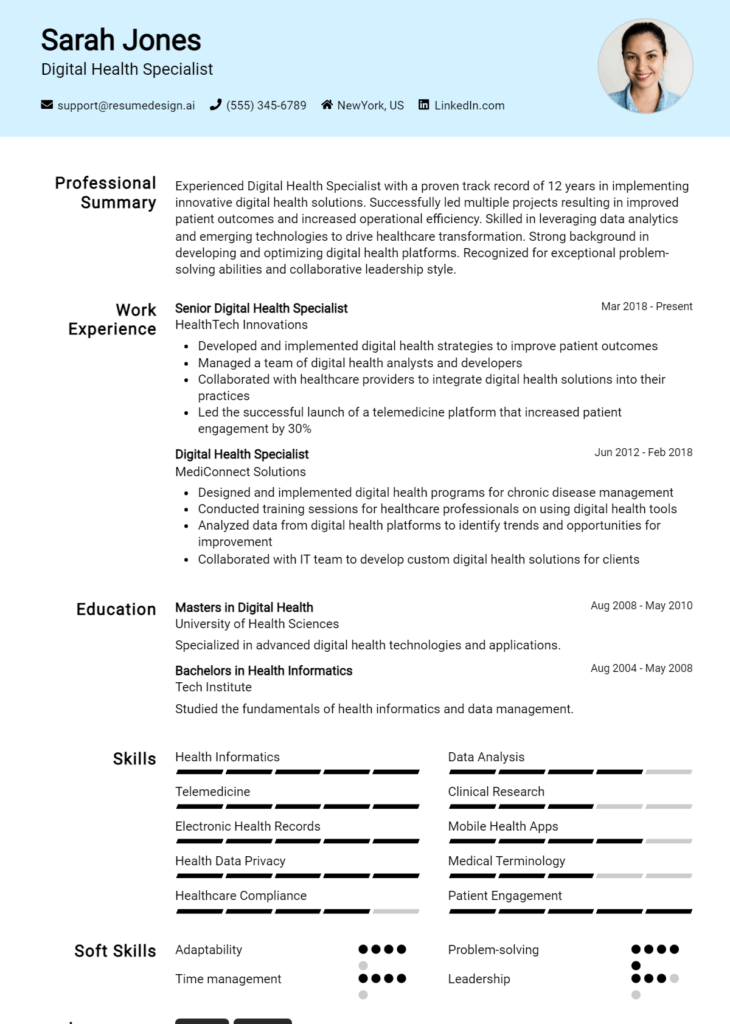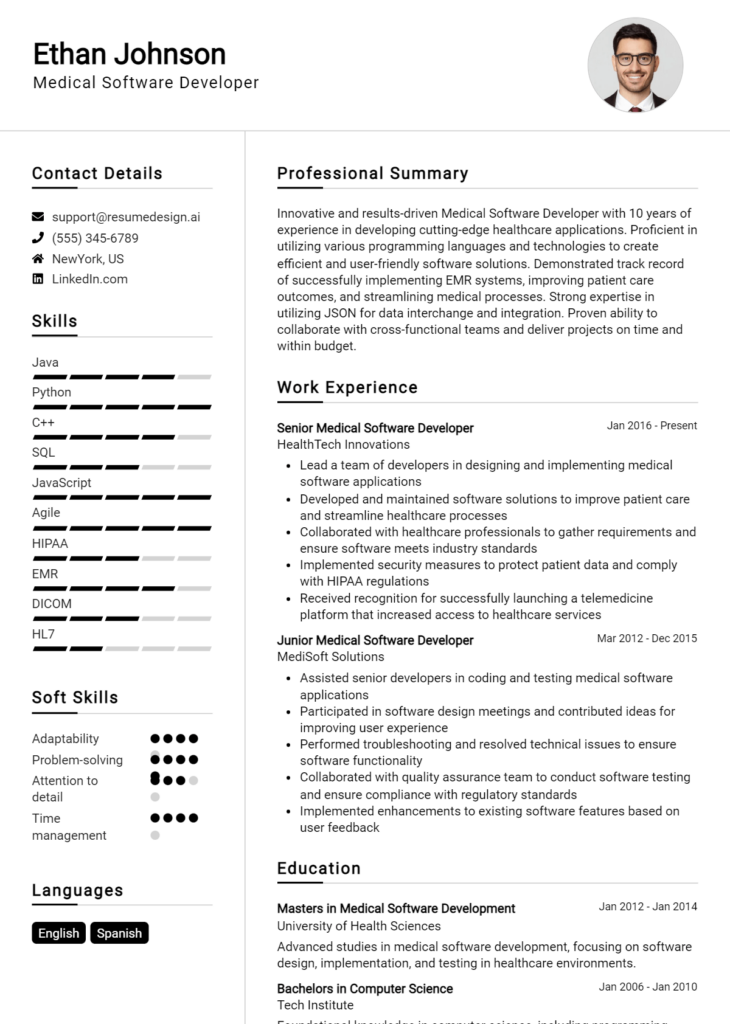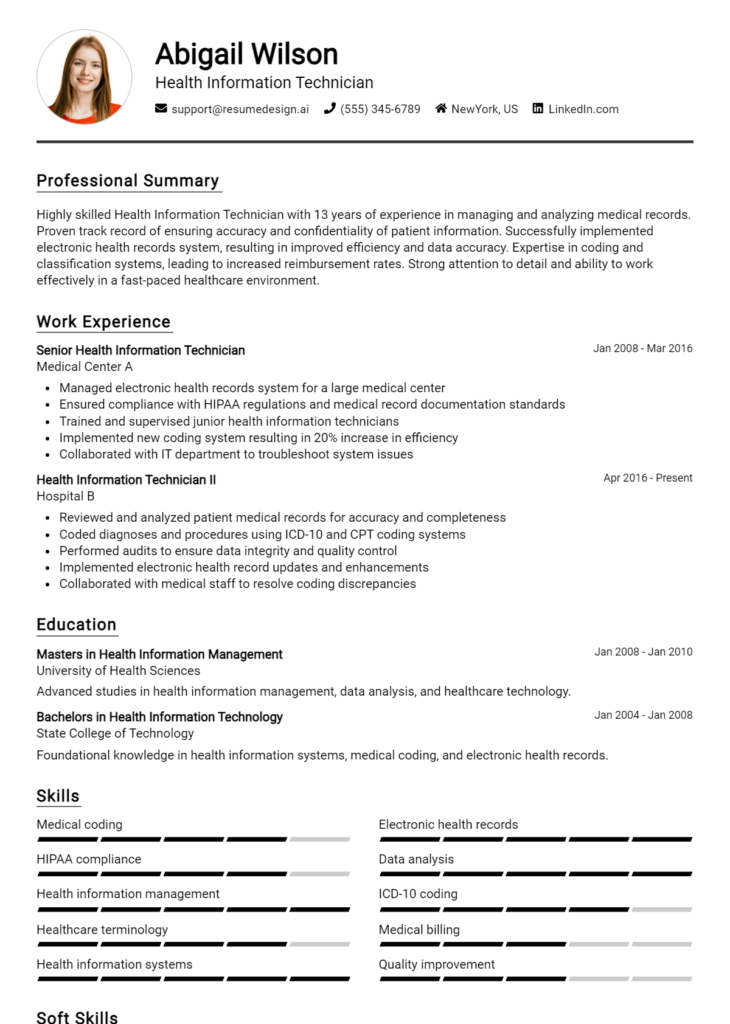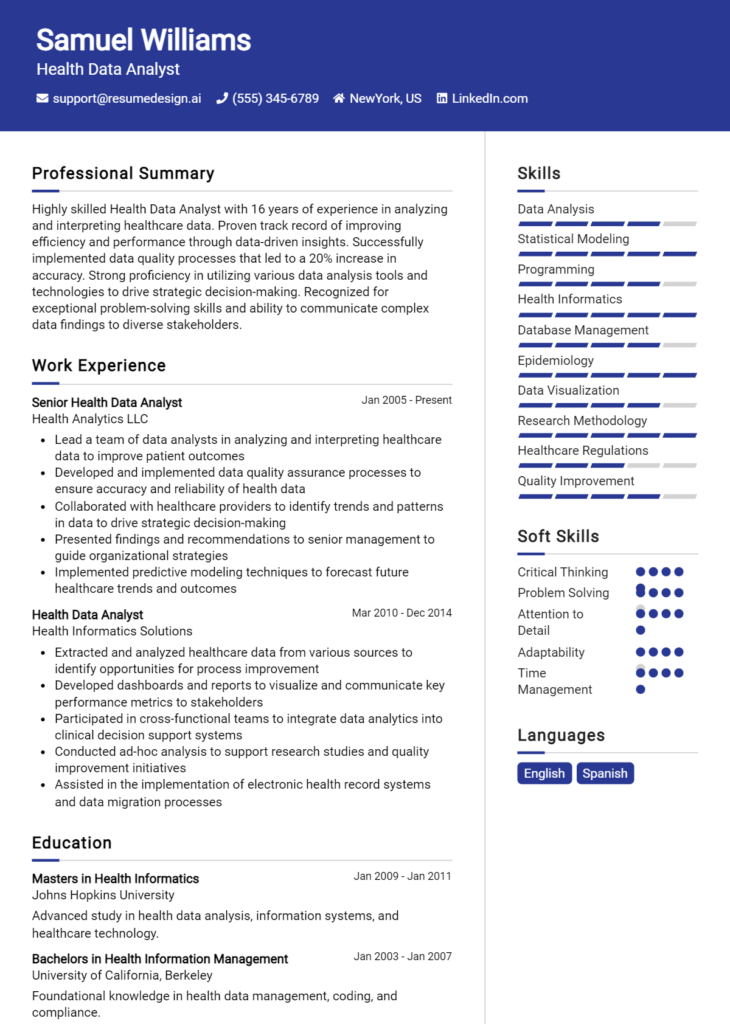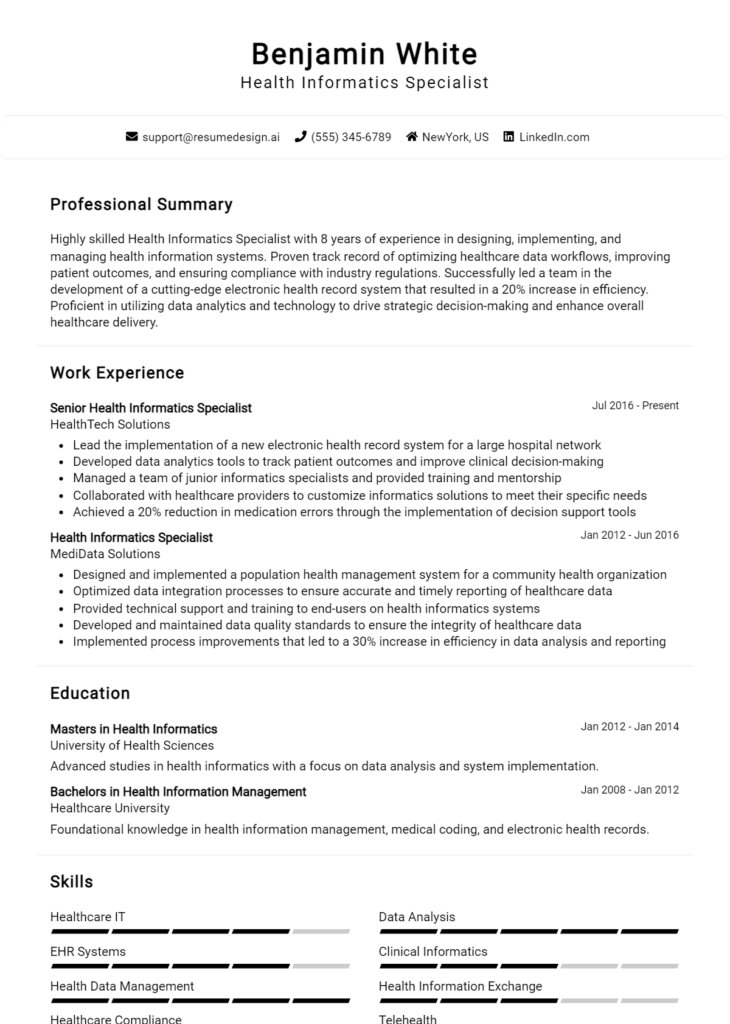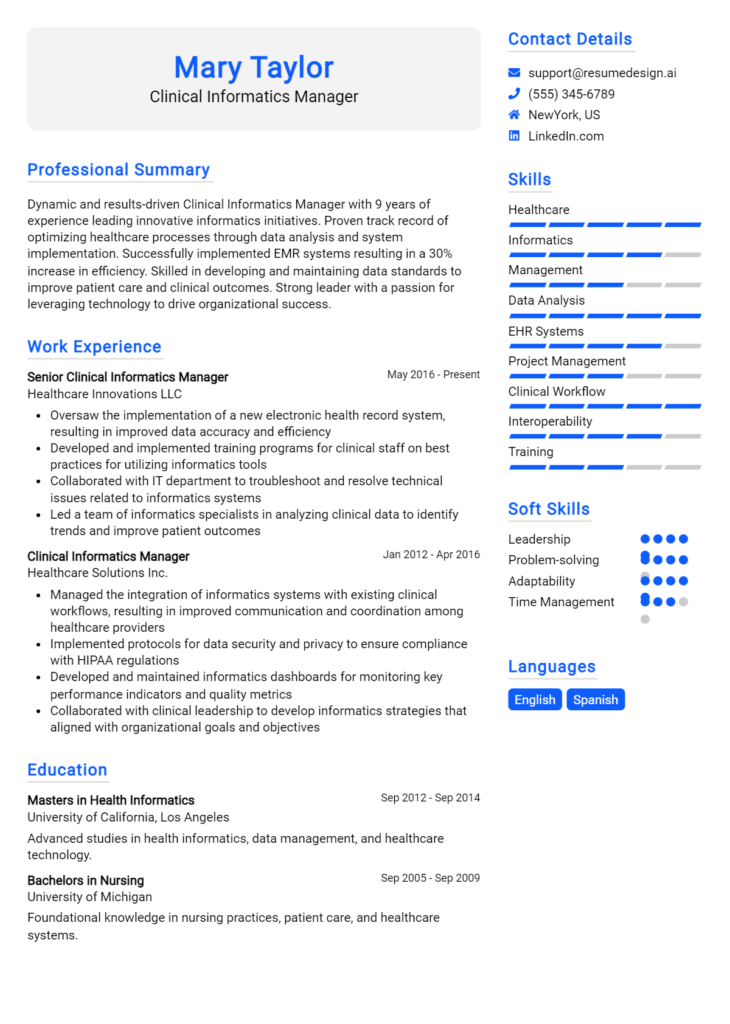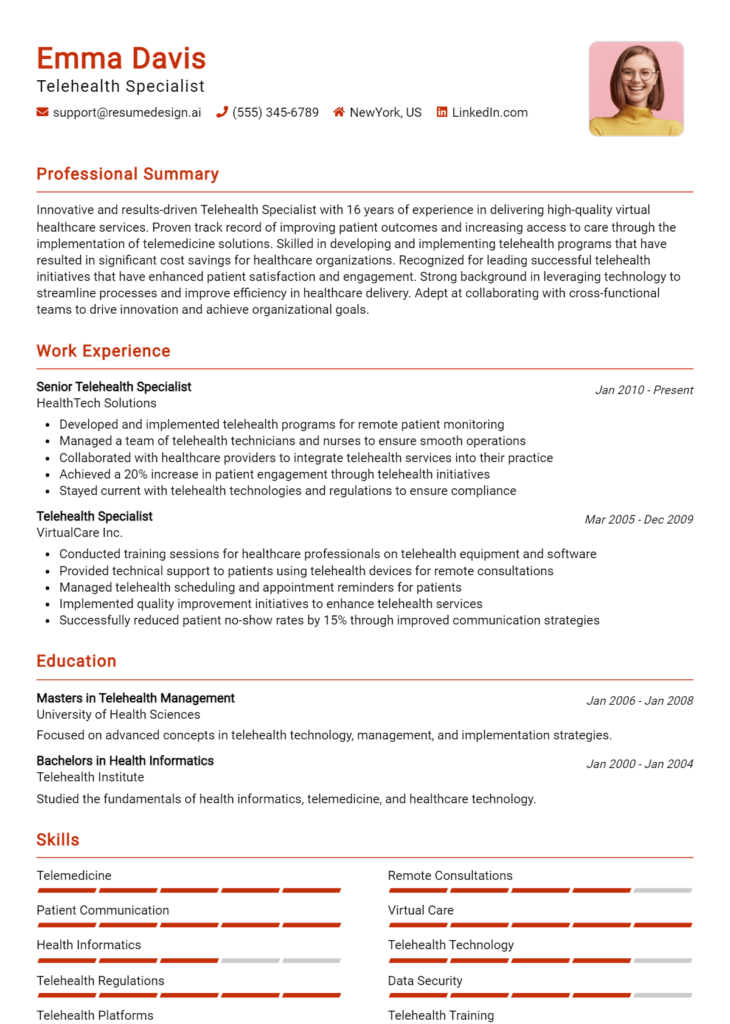Clinical Data Manager Core Responsibilities
A Clinical Data Manager plays a pivotal role in the clinical research landscape, ensuring the integrity and accuracy of data collected during trials. Key responsibilities include designing data management plans, overseeing data collection processes, and ensuring compliance with regulatory standards. They bridge clinical, statistical, and regulatory departments, requiring strong technical skills, operational expertise, and exceptional problem-solving abilities. These competencies are vital for driving the organization's research goals forward, and a well-structured resume can effectively highlight these qualifications.
Common Responsibilities Listed on Clinical Data Manager Resume
- Develop and implement data management plans and protocols.
- Ensure data integrity and compliance with regulatory requirements.
- Coordinate data collection activities across multiple sites.
- Monitor data entry and perform quality control checks.
- Collaborate with cross-functional teams to resolve data issues.
- Prepare data for statistical analysis and reporting.
- Manage data queries and facilitate resolution processes.
- Conduct training sessions for data entry personnel.
- Utilize data management software and tools effectively.
- Prepare documentation for audits and inspections.
- Analyze trends and provide insights to enhance data collection methods.
- Stay updated on industry standards and best practices in data management.
High-Level Resume Tips for Clinical Data Manager Professionals
In today's competitive job market, a well-crafted resume is essential for Clinical Data Manager professionals seeking to make a lasting impression on potential employers. Your resume serves as the first point of contact, offering a snapshot of your skills, experience, and achievements. It is crucial to ensure that this document not only highlights your qualifications but also resonates with the specific needs of the hiring organization. This guide will provide you with practical and actionable resume tips tailored specifically for Clinical Data Manager professionals, helping you to effectively showcase your expertise and stand out in the crowd.
Top Resume Tips for Clinical Data Manager Professionals
- Tailor your resume to each job description by incorporating relevant keywords and phrases that match the role's requirements.
- Highlight your experience with clinical trials, data management software, and regulatory compliance to demonstrate your industry knowledge.
- Quantify your achievements by including metrics, such as the number of trials managed or the percentage of data accuracy improvements.
- Showcase your technical skills, including proficiency in statistical software and database management tools, which are essential for the role.
- Include certifications relevant to clinical data management, such as Clinical Research Associate (CRA) or Clinical Data Manager (CDM) certifications.
- Emphasize your ability to collaborate with cross-functional teams, showcasing your communication and interpersonal skills.
- Highlight any experience with data validation and quality control processes, as these are critical in ensuring data integrity.
- Use action verbs to convey your contributions effectively, such as "managed," "developed," or "collaborated."
- Keep your resume concise and focused, ideally one to two pages, ensuring it’s easy for hiring managers to digest your qualifications quickly.
By implementing these tips, you can significantly enhance your resume, increasing your chances of landing a job in the Clinical Data Manager field. A targeted and well-structured resume not only showcases your qualifications but also demonstrates your understanding of the role, making you a compelling candidate for potential employers.
Why Resume Headlines & Titles are Important for Clinical Data Manager
In the competitive field of clinical data management, having a standout resume is crucial for attracting the attention of hiring managers. Resume headlines and titles serve as a powerful first impression, summarizing a candidate's key qualifications in just a few impactful words. A well-crafted headline can instantly communicate a candidate's expertise, relevant experience, and suitability for the role, making it easier for hiring managers to identify top talent. Therefore, it is essential that these headlines are concise, relevant, and directly aligned with the job being applied for, ensuring they not only catch the eye but also convey the necessary qualifications at a glance.
Best Practices for Crafting Resume Headlines for Clinical Data Manager
- Keep it concise—aim for one impactful phrase.
- Use role-specific keywords that align with the job description.
- Highlight your most relevant skills and accomplishments.
- Focus on the value you bring to potential employers.
- Avoid generic phrases; be specific about your expertise.
- Incorporate measurable achievements when possible.
- Ensure the tone matches the professional standards of the industry.
- Tailor your headline for each application to enhance relevance.
Example Resume Headlines for Clinical Data Manager
Strong Resume Headlines
"Experienced Clinical Data Manager with Proven Track Record in Successful Trial Management"
“Detail-Oriented Clinical Data Specialist with 5+ Years in Oncology Research Data Management”
“Certified Clinical Data Manager Expert in Data Quality Assurance and Regulatory Compliance”
“Results-Driven Clinical Data Manager with Expertise in Biostatistics and Data Analysis”
Weak Resume Headlines
“Looking for a Job in Data Management”
“Clinical Data Manager”
“Experienced Professional”
The strong headlines effectively convey the candidate’s qualifications and specializations, making them appealing and relevant to hiring managers. They provide specific information about the candidate’s experience and skills, creating a compelling narrative that invites further exploration of the resume. In contrast, the weak headlines lack specificity and do not communicate any unique value or relevant experience, failing to capture the attention of potential employers and missing the opportunity to stand out in a crowded field.
Writing an Exceptional Clinical Data Manager Resume Summary
A well-crafted resume summary is crucial for a Clinical Data Manager, as it serves as the first impression for hiring managers. An impactful summary succinctly highlights key skills, relevant experience, and significant accomplishments that align with the job role, allowing candidates to stand out in a competitive job market. By presenting a clear and concise overview of qualifications, a strong summary captures attention quickly and encourages employers to delve deeper into the resume, making it an essential component of the application process.
Best Practices for Writing a Clinical Data Manager Resume Summary
- Quantify achievements: Use numbers to demonstrate your impact, such as the number of projects managed or the percentage of data accuracy improved.
- Focus on relevant skills: Highlight specific skills that are crucial for the role, such as data management systems, statistical analysis, or regulatory compliance.
- Tailor to the job description: Customize your summary to reflect the keywords and requirements mentioned in the job posting.
- Keep it concise: Aim for 3-5 sentences that effectively summarize your qualifications without overwhelming the reader.
- Showcase accomplishments: Mention any awards, recognitions, or certifications that enhance your credibility as a Clinical Data Manager.
- Use action verbs: Start with strong action verbs to convey confidence and proactivity in your work.
- Avoid jargon: Use clear language that can be understood by hiring managers who may not have a technical background.
- Highlight collaborative experience: If applicable, mention your experience working with cross-functional teams or stakeholders, as collaboration is critical in clinical data management.
Example Clinical Data Manager Resume Summaries
Strong Resume Summaries
Detail-oriented Clinical Data Manager with over 8 years of experience in managing clinical trial data, leading to a 20% increase in data accuracy through the implementation of quality control processes. Proficient in SAS and EDC systems, with a proven track record of collaborating with cross-functional teams to ensure compliance with FDA regulations.
Results-driven Clinical Data Manager who has successfully overseen data management for over 15 clinical trials, achieving a 95% on-time delivery rate. Skilled in data analysis, report generation, and database design, with strong knowledge of GCP and ICH guidelines.
Accomplished Clinical Data Manager with a strong background in statistical analysis and data integrity. Led a project that reduced data entry errors by 30% through the introduction of automated checks. Certified in Clinical Data Management (CCDM) and experienced in using Medidata Rave and Oracle Clinical.
Weak Resume Summaries
Clinical Data Manager with experience in clinical trials and data management. Good at working with teams and handling data.
Dedicated professional seeking a Clinical Data Manager position. I have experience in various roles and am eager to contribute to the team.
The examples of strong resume summaries are considered effective as they provide specific information about skills, quantify achievements, and relate directly to the responsibilities of a Clinical Data Manager. In contrast, the weak summaries lack detail, do not include measurable outcomes, and appear too generic, failing to convey the candidate's true value to potential employers.
Work Experience Section for Clinical Data Manager Resume
The work experience section is a critical component of a Clinical Data Manager resume, as it serves as a comprehensive showcase of the candidate's technical skills, leadership abilities, and commitment to delivering high-quality data products. This section allows potential employers to gauge the applicant's proficiency in managing clinical data processes, collaborating with cross-functional teams, and adhering to industry regulations. By quantifying achievements and aligning experience with industry standards, candidates can effectively demonstrate their value and readiness for the role.
Best Practices for Clinical Data Manager Work Experience
- Use specific metrics to quantify your achievements, such as the number of trials managed or data accuracy rates.
- Highlight your proficiency with clinical data management tools and software, including EDC platforms and statistical analysis programs.
- Emphasize your leadership experience, particularly in managing teams and mentoring junior staff.
- Detail your collaboration with cross-functional teams, including clinical operations, biostatistics, and regulatory affairs.
- Focus on your contributions to improving data quality and compliance with regulatory standards.
- Showcase your ability to manage timelines and deliver projects on schedule.
- Include relevant certifications or training that enhance your technical expertise.
- Tailor your experience to match the specific requirements listed in the job description.
Example Work Experiences for Clinical Data Manager
Strong Experiences
- Managed a team of 5 data analysts to successfully complete 10 clinical trials, achieving a data accuracy rate of 99% and reducing data entry errors by 30%.
- Implemented a new electronic data capture (EDC) system that streamlined data collection processes, resulting in a 25% reduction in project timelines.
- Collaborated with biostatisticians to develop a comprehensive data analysis plan, leading to the successful submission of three new drug applications to regulatory authorities.
- Conducted training sessions for staff on data management best practices, increasing team efficiency by 20% and enhancing compliance with FDA regulations.
Weak Experiences
- Worked on clinical trials and helped with data management tasks.
- Participated in meetings to discuss data issues.
- Assisted in data entry and other related activities.
- Contributed to projects as a team member.
The examples of strong experiences demonstrate concrete achievements, such as quantifiable outcomes and clear leadership roles, which effectively highlight the candidate's impact in their previous positions. In contrast, the weak experiences lack specificity and measurable results, making them unimpressive and less likely to catch the attention of hiring managers. Strong experiences provide a clearer picture of the candidate's capabilities and contributions, whereas weak experiences tend to be vague and fail to showcase the candidate's true potential.
Education and Certifications Section for Clinical Data Manager Resume
The education and certifications section of a Clinical Data Manager resume is critical as it serves as a strong foundation for the candidate's qualifications. This section not only showcases the academic background relevant to the field but also emphasizes industry-recognized certifications and continuous learning efforts that are essential in the ever-evolving landscape of clinical data management. By detailing relevant coursework, certifications, and any specialized training, candidates can significantly enhance their credibility and demonstrate their alignment with the job role, thereby increasing their chances of securing an interview.
Best Practices for Clinical Data Manager Education and Certifications
- Include only relevant degrees and certifications that directly relate to clinical data management.
- Highlight advanced degrees (e.g., Master's, PhD) that indicate a higher level of expertise.
- List industry-recognized certifications such as Clinical Research Associate (CRA) or Clinical Data Manager (CDM).
- Provide details of relevant coursework that showcases specific skills or knowledge applicable to the role.
- Include any specialized training programs that enhance your qualifications.
- Keep the section concise and focused, avoiding unnecessary details about unrelated education.
- Use a clear and organized format to improve readability and impact.
- Update this section regularly to reflect new certifications or completed training programs.
Example Education and Certifications for Clinical Data Manager
Strong Examples
- M.Sc. in Clinical Research, University of Health Sciences, 2022
- Certified Clinical Data Manager (CCDM), Society for Clinical Data Management, 2023
- Advanced Statistical Methods for Clinical Trials, Online Course, 2021
- B.Sc. in Biostatistics, University of Statistics, 2020
Weak Examples
- B.A. in English Literature, University of Arts, 2015
- Certification in Project Management (outdated, completed in 2017)
- General Computer Skills Course, Local Community Center, 2020
- High School Diploma, 2010
The strong examples are considered robust because they directly relate to the skills and knowledge required for a Clinical Data Manager, showcasing both relevant degrees and current certifications that are recognized in the industry. In contrast, the weak examples lack relevance to the role, featuring outdated or unrelated qualifications that do not enhance the candidate's profile in the field of clinical data management.
Top Skills & Keywords for Clinical Data Manager Resume
The role of a Clinical Data Manager is pivotal in the healthcare and pharmaceutical industries, ensuring that the data collected during clinical trials is accurate, reliable, and compliant with regulatory standards. Crafting a compelling resume for this position requires highlighting both hard and soft skills that reflect proficiency in data management, attention to detail, and effective communication. Employers are keen to see how your skills align with the demands of the job, making it essential to showcase your capabilities clearly and concisely. A well-structured resume that emphasizes relevant skills can significantly enhance your chances of standing out in a competitive job market. For further insights on how to effectively present your skills, check out this resource on skills and consider the importance of showcasing your work experience.
Top Hard & Soft Skills for Clinical Data Manager
Soft Skills
- Attention to Detail
- Effective Communication
- Problem-Solving
- Team Collaboration
- Time Management
- Adaptability
- Critical Thinking
- Leadership
- Interpersonal Skills
- Project Management
Hard Skills
- Clinical Data Management Software (e.g., EDC systems)
- Statistical Analysis
- Data Cleaning and Validation
- Regulatory Compliance (FDA, ICH)
- Database Management
- Programming Languages (e.g., SAS, R)
- Electronic Health Records (EHR) Management
- Data Visualization Tools (e.g., Tableau)
- Quality Assurance
- Research Methodology
Stand Out with a Winning Clinical Data Manager Cover Letter
Dear Hiring Manager,
I am writing to express my interest in the Clinical Data Manager position at [Company Name], as advertised on [where you found the job listing]. With a robust background in clinical research and data management, combined with a keen eye for detail, I am confident in my ability to contribute effectively to your team and support the successful execution of clinical trials. My experience in overseeing data collection, validation, and reporting processes aligns well with the requirements of this role.
In my previous position at [Previous Company Name], I managed clinical data for multiple Phase II and III trials, ensuring the accuracy and integrity of data collected from various sources. I implemented standard operating procedures that reduced data discrepancies by 30%, significantly improving the overall quality of our datasets. My proficiency in utilizing electronic data capture systems and statistical software has enhanced my capability to analyze complex data and deliver actionable insights to stakeholders. I pride myself on my ability to communicate effectively with cross-functional teams, ensuring that data management processes align with clinical objectives.
Moreover, my commitment to continuous improvement drives me to stay abreast of industry trends and regulatory changes. I have participated in several training programs focused on Good Clinical Practice (GCP) and data governance, which have equipped me with the knowledge necessary to navigate the evolving landscape of clinical data management. I am excited about the opportunity to bring my expertise in data integrity and compliance to [Company Name], contributing to the advancement of groundbreaking therapies that improve patient outcomes.
I am eager to discuss how my background and skills align with the goals of your organization. Thank you for considering my application. I look forward to the possibility of discussing this exciting opportunity with you.
Sincerely,
[Your Name]
[Your Contact Information]
Common Mistakes to Avoid in a Clinical Data Manager Resume
When applying for a position as a Clinical Data Manager, it’s crucial to present a resume that highlights relevant experience and skills effectively. However, many candidates make common mistakes that can hinder their chances of landing an interview. Understanding these pitfalls can help you craft a compelling resume that showcases your qualifications and sets you apart in a competitive job market.
Lack of Tailoring: Failing to customize your resume for the specific job can result in missed opportunities. Each position may require different skills or experiences, so tailor your resume to reflect the job description.
Overloading with Jargon: While industry-specific terms can demonstrate expertise, excessive jargon can confuse hiring managers. Strive for a balance that maintains professionalism without alienating readers.
Neglecting Metrics: Omitting quantifiable achievements may weaken your impact. Use specific metrics to illustrate your contributions, such as the number of clinical trials managed or data integrity improvements achieved.
Ignoring Gaps in Employment: Leaving unexplained gaps in your employment history can raise red flags. Address any gaps directly in your resume, providing context or detailing relevant activities during that time.
Standard Formatting: Using generic templates or inconsistent formatting can make your resume look unprofessional. Opt for a clean, organized layout that enhances readability and presents your information clearly.
Vague Job Descriptions: Providing overly simplistic or vague descriptions of your roles can fail to convey your responsibilities and accomplishments. Be specific about your job functions, tools used, and outcomes achieved.
Missing Keywords: Not incorporating relevant keywords from the job description may lead to your resume being overlooked by applicant tracking systems. Identify key terms and ensure they are naturally integrated into your resume.
Overemphasis on Education: While educational background is important, placing too much emphasis on it can detract from your practical experience. Focus on showcasing your hands-on skills and relevant work history to demonstrate your qualifications.
Conclusion
As a Clinical Data Manager, your role is crucial in ensuring the integrity, accuracy, and confidentiality of clinical trial data. You are responsible for designing and implementing data management plans, overseeing data collection processes, and ensuring compliance with regulatory requirements. Your expertise in data analysis and strong attention to detail play a significant role in supporting clinical research and ultimately improving patient outcomes.
In summary, the key points to consider in your career as a Clinical Data Manager include:
- Understanding Regulatory Standards: Familiarity with regulations such as GCP, FDA, and ICH guidelines is essential for compliance and data integrity.
- Data Management Skills: Proficiency in various data management systems and tools is vital for effective data collection, storage, and analysis.
- Collaboration: Working closely with clinical teams, statisticians, and regulatory bodies is important for the success of clinical trials.
- Problem-Solving: Strong analytical skills and the ability to troubleshoot data issues promptly are necessary traits for this role.
Now is the perfect time to ensure your resume reflects these competencies and showcases your unique qualifications. Take advantage of available resources to enhance your job application. Explore our resume templates to find a layout that suits your style, use our resume builder for a streamlined creation process, and check out resume examples for inspiration. Don’t forget to craft a compelling introduction with our cover letter templates that will grab the attention of hiring managers.
Take action today and polish your Clinical Data Manager resume to stand out in this competitive field!

